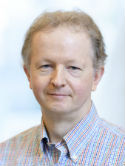Molecular biology of novel targets identified through study of castration-recurrent prostate cancer Book Section
| Authors: | Watson, P. A.; Sawyers, C. L. |
| Editors: | Tindall, D.; Mohler, J. |
| Article/Chapter Title: | Molecular biology of novel targets identified through study of castration-recurrent prostate cancer |
| Abstract: | Prostate cancer that recurs in men after complete androgen deprivation therapy remains today a lethal disease. Reactivation of androgen receptor (AR) signaling in the setting of castrate levels of androgen is widely accepted to be the dominant factor leading to prostate cancer progression. The mechanisms driving AR activation in clinical castration-recurrent prostate cancer (CRPC) are poorly understood. A number of hypotheses have been put forth to explain castrate-activated AR based on examination of patient material and the use of prostate cancer model systems. AR ligand binding domain mutations that confer gain-of-function properties through expanded use of alternative steroid ligands and overexpression of the non-mutated AR, with or without concurring genomic amplification, are two of the most widely cited hypotheses. Recently, much attention has been paid to the hypothesis that CRPC acquires the capacity to synthesize testosterone directly. Perturbation of AR signaling remains the main therapeutic objective. New drugs currently in clinical trials may offer some improved management of CRPC through antagonism of AR activity or blockage of extratesticular androgen production. Ultimately, the identification of drugs that promote selective AR degradation may have the greatest impact against the continued action of AR in CRPC. Androgen deprivation therapy to reduce androgen receptor (AR) signaling is the mainstay treatment for prostate cancer patients who are not cured by primary local therapy (Hellerstedt and Pienta 2002). Typically, patients receive bilateral orchiectomy or medical castration through the use of luteinizing hormone-releasing hormone (LHRH) agonists to deplete 90% of serum testosterone. Often, androgen deprivation therapy includes the use of an antiandrogen (hydroxyflutamide, bicalutamide) to directly antagonize AR transactivation. Androgen deprivation therapy leads to a temporary remission in approximately 90%of patients with advanced prostate cancer, but uniformly a fatal form of the cancer will remerge in the castrate environment. At this point,median overall survival is only 23-37 months (Hellerstedt and Pienta 2002) and further treatment is only palliative. The molecular events that lead to the progression of prostate cancer from a state of androgen stimulation to that of castration recurrence are poorly understood. However, it is clear that the AR plays a central role in the biology of castration-recurrent prostate cancer (CRPC). This chapter highlights the key lines of evidence derived from both clinical and preclinical observations that point to the continued activity of AR in CRPC and discuss the recent use of novel compounds designed to interfere with AR function. © 2009 Springer-Verlag New York. |
| Book Title: | Androgen Action in Prostate Cancer |
| ISBN: | 978-0-387-69177-0 |
| Publisher: | Springer |
| Publication Place: | New York, NY |
| Date Published: | 2009-01-01 |
| Start Page: | 743 |
| End Page: | 754 |
| Language: | English |
| DOI: | 10.1007/978-0-387-69179-4_32 |
| PROVIDER: | scopus |
| DOI/URL: | |
| Notes: | Androgen Action in Prost. Cancer -- 9780387691770 (ISBN) -- Export Date: 8 July 2014 -- Source: Scopus |
Altmetric
Citation Impact
BMJ Impact Analytics
Related MSK Work




